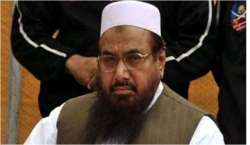Pakistan court indicts JuD chief Hafiz Saeed's 4 close aides in terror financing case
An anti-terrorism court in Pakistan on Tuesday indicted four top leaders of the banned Jamaat-ud-Dawah (JuD) and close aides of the 2008 Mumbai terror attack mastermind Hafiz Saeed in a terror-financing case.

An anti-terrorism court in Pakistan on Tuesday indicted four top leaders of the banned Jamaat-ud-Dawah (JuD) and close aides of the 2008 Mumbai terror attack mastermind Hafiz Saeed in a terror-financing case.
The court indicted Hafiz Abdul Rehman Makki, Malik Zafar Iqbal, Yayha Aziz and Abdul Salam in one of the cases registered against them on terror financing charges.
All the four accused, however, pleaded "not guilty" and chose to contest the trial.
The court adjourned the proceedings till Wednesday, with direction to the prosecution to present witnesses against the suspects.
The Counter Terrorism Department (CTD) of Punjab police had registered 23 FIRs against 70-year-old Saeed and his accomplices on the charges of terror financing in different cities of the province.
Saeed, a UN designated terrorist whom the US has placed a USD 10 million bounty on, was arrested on July 17, 2019 and is lodged at the high-security Kot Lakhpat jail here.
Saeed-led JuD is the front organisation for the Lashkar-e-Taiba which is responsible for carrying out the 2008 Mumbai attack that killed 166 people, including six Americans.
The US named Saeed as a Specially Designated Global Terrorist, and the US, since 2012, has offered a USD 10 million reward for information that brings Saeed to justice. He was listed as a terrorist under the UN Security Council Resolution 1267 in December 2008.
In February, Lahore's anti-terrorism court sentenced Saeed and his close aide Zafar Iqbal to five and a half years each and imposed a fine of Rs 15,000 in each case. A total of 11 years sentence will run concurrently.
The US welcomed the conviction of Saeed and described it as an "important step forward" for Pakistan in meeting its international commitments to combat terror financing and not to allow non-state actors to operate from its soil.
The crackdown on Saeed's outfit last year followed a warning by the international terror financing watchdog to Pakistan to deliver on its commitments to curb terror financing and money laundering.
ALSO READ | President Donald Trump rules out defunding of police; says they protect people by risking own lives